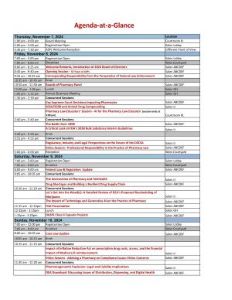Back
Let's Get Into the Weed(s): A Detailed Review of DEA's Proposed Rescheduling of Marijuana.
Saturday, November 9, 2024
10:10 AM – 11:10 AM MT
Location: Salon IJ
CE: 1

Karla L. Palmer, JD, Director
Director
Hyman Phelps
Washington, District of Columbia, United States
Kalie E. Richardson, JD
Associate
Hyman Phelps
Washington, District of Columbia, United States
Primary Presenter(s)
Co-Presenter(s)
The pressure to downschedule, or completely deschedule, marijuana as been a hot topic of debate among politicians, Congress, federal agencies, state governments, practitioners and private citizens for over two decades. This presentation will discuss DEA's historical scheduling of marijuana in CSA Schedule 1, and its stated basis for doing so, reviewing international treaties and the eight factors that DEA must consider when making a scheduling determination. We will next address petitions -- filed 20 years ago -- to deschedule marijuana, and DEA's late-dated 2016 analysis and response those petitions, which denied the petitions to reschedule or deschedule marijuana because DEA determined there was no legitimate use of marijuana in medical practice in the United States. Next, we will address the significant "federal conundrum" presented by actions in approximately 37 states that have voted to either legalize marijuana for medicinal or recreational use over the past ten years, and the Department of Justice's, Congress' and different presidential administrations' responses to the same. Our presentation will next move to the review of the current, highly publicized federal push to reschedule marijuana. We will review presidential announcements, Congressional communications with the DEA and proposed legislation, and FDA's and DEA's responses. We will "walk through" DEA's statutorily required and current eight-factor analysis that it conducted to recommend moving marijuana to Schedule III, and examine briefly the international treaties that may actually require placement in that Schedule. In addition, we will address DEA's proposed rule to reclassify marijuana to DEA's Schedule, which DEA proposed in May of 2024. Lastly, we will consider, based on our experience representing handlers of controlled substances including drug manufacturers, distributors, and pharmacies any "real world" hurdles that placing marijuana in Schedule III will likely present, particularly in light of the fact that the majority of state laws have legalized marijuana's medicinal or recreational use. We intend to leave time for questions from the audience on this important and timely topic.
Learning Objectives:
- Understand the historical basis upon which the Drug Enforcement Administration originally determined to place marijuana in Schedule I of the the Controlled Substances Act.
- Demonstrate knowledge of the changing landscape of the use and regulation of marijuana, both federally and in states, in particular in the current administration including DEA's 2023 down-scheduling analysis.
- Understand the interplay between DEA scheduling of controlled substances and the impact that international treaties may have on DEA's scheduling options and decisions.
- Describe the conflicting federal and state objectives concerning the approval, scheduling, use, decriminalization, and marketing and distribution of marijuana products in the United States.

